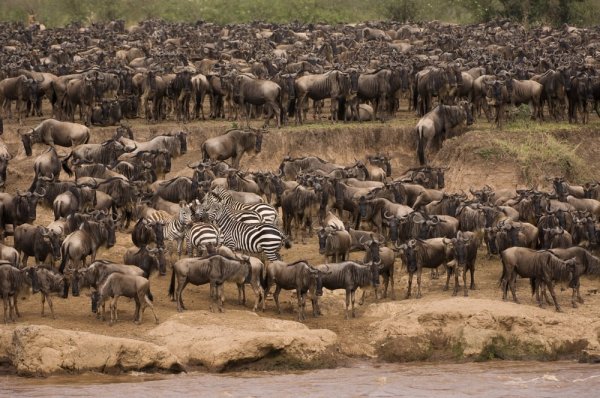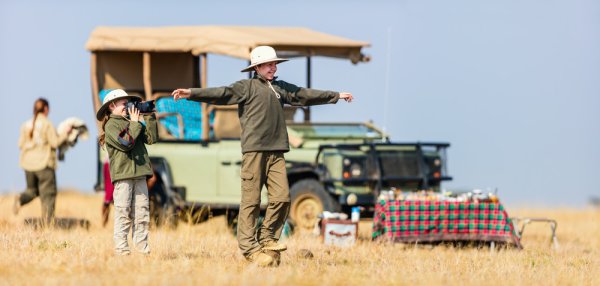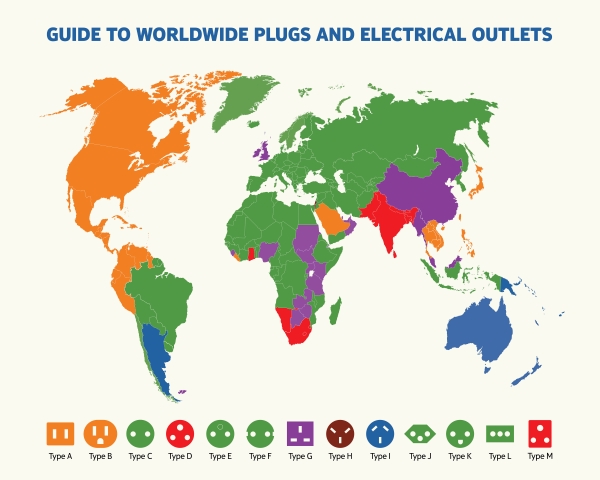Gearing up for a safari adventure? Lucky you! Before you head off into the savannah armed with countless camera cards and extra batteries, let's talk attire. What are the best clothes to wear on safari? After waiting this long for your once-in-a-lifetime African safari adventure, the last thing you want is to be caught out in the wild unprepared.
Here's a comprehensive lowdown on what to wear on safari, your essential Africa safari packing list, and a bunch of other invaluable tips from those who've been there and done that—like us here at Viva Expeditions. We'll detail what to consider, what NOT to wear, and what other things you should keep in mind.
What to wear on safari in Africa – a general overview
First off, comfort is key. Whether you're on a Tanzania safari tour or a South Africa safari tour, you'll spend a lot of time in safari vehicles or walking on uneven and at-times harsh terrain, so opt for lightweight, breathable fabrics like linen or cotton. Trust us, you'll thank yourself when the sun starts beating down relentlessly.
Now, let's talk colours. On a safari, you aim to blend in rather than stand out. Opt for earthy tones like khaki, olive, beige, and tan. Leave the bright colours at home – not only do dark colours like blue, purple and black attract pesky insects like tsetse flies, but brighter hues like red and yellow can make you stand out for all the wrong reasons.
Black and white should definitely not be in your ensemble.

What’s black and white and meanders the African savannah? Lunch for a lion!
Layering is another smart move. Early mornings can get pretty chilly out on safari, but things heat up fast once the sun is up. So, pack a mix of long-sleeved shirts, lightweight jackets, and breathable pants. That way, you can peel off or pile on layers as needed. Oh, and don't forget a trusty safari vest – just another name for a vest with multiple pockets. It's not just for looks – those pockets are perfect for stashing your camera, sunscreen, and other essentials.
Let’s move on to footwear. Flip-flops and sandals might be comfortable in your safari lodge cabin, but when it comes to sensible footwear for the outdoors, pack sturdy, closed-toe shoes like hiking boots or sneakers. You'll be doing a lot of walking, so comfort and support are key. And don't forget to break those new shoes in before you hit the trail—blisters are nobody's idea of a good time on safari.
When it comes to accessories, less is more. Leave the flashy jewellery and fancy gadgets behind – you don't want anything weighing you down or attracting unwanted attention. A lightweight, waterproof watch is all you really need to keep track of time. Don't forget a good insect repellent – those bugs can be relentless!
When choosing a hat, you must relegate 'fashionable' to second-place priority. You'll ideally want a hat that covers your face and neck and is made of breathable, waterproof material on the outside. Above all else, your hat needs to protect you from the sun – match that with sunscreen and sunglasses and you’re good to go.

The best things to wear on safari – neutral colours, natural fibres, and a wide-brim hat to protect from the sun
Top tips on safari essentials – things to keep in mind
Here are some nifty tips to make sure you're all set for the adventure of a lifetime:
Watch those luggage restrictions!
When it comes to luggage for your African safari, you'll want to keep your bags light and flexible. Think soft bags without those clunky wheels—especially if you are planning on a flying safari in Botswana or Namibia. Internal flights are on small light planes, which have strict luggage limits—large rigid suitcases won't be allowed. Typically, all safari outfitters limit luggage to one piece per person, with a max of 15 kg (33lb).
Learn how to create a capsule wardrobe
The best minimalist travel trend, the capsule wardrobe is simply a collection of clothing that can easily be mixed to create a variety of outfits from a few essential items. Sure, fashionistas shouldn't worry too much about how they look on safari, but capsule wardrobes make your travel life seamless, no matter where you go. Here’s a great rundown of the concept from Modern Minimalism that is easily adapted to an African safari adventure.
Laundry and toiletries at your accommodation
Here's a little insider secret: most safari lodges and camps offer laundry services and basic toiletries. Pack small travel-sized bottles to get you started and replenish as you go along. There's no need to pack your entire wardrobe or make many changes as you'll be able to have clothing laundered at your accommodation.
Hairdryers
The best idea is to leave your hairdryer at home, it most likely won’t be the same voltage anyway, and may affect the lodges power supply. (many rely on solar power) Most hotels will have one in your room, and at lodges, if there is not one in your room, then ask to borrow one from reception.
Pack the right adapters & power banks
Electricity outlets in Africa probably differ from the ones back home. Research your specific destination and pack the right adapters. Power supply even in remote regions of Africa is reasonably reliable but power shortages are not uncommon. Consider packing a power bank to top up your phone and camera and an extra battery – the idea being that you should always have around 48 hours of backup power if needed.

General guideline of power outlets worldwide – note the differences between regions and countries in Africa.
Avoid white
White clothing may appear pristine and stylish, but it's impractical for an African safari. Not only does white stand out starkly against the natural landscape, but it also tends to get dirty easily, especially in dusty or muddy conditions. Spare yourself the hassle and opt for more practical attire that won't betray you before breakfast.
Steer clear of camouflage print
Camouflage-print clothing may have been fashionable in Western countries, but in Africa (and many other parts of the world), camo print screams military, police, militia, etc. You really don't want to be travelling around on an African safari with anything camouflage-print.
Check the weather forecast for your specific safari destinations
Last but not least, don't forget to check the weather forecast before you go. Africa's climate can be unpredictable, and there can be quite a bit of difference – both in terms of temperature and rainfall – depending on where you go and what time of year you’re travelling. Although, by and large, an Africa safari packing list is pretty universal, there are a few different things you’ll need to focus on packing if you are gorilla trekking in Uganda or Rwanda, wildlife spotting in Botswana or joining a classic safari in Kenya and Tanzania.
It's always best to be prepared for anything and everything. No matter where you go, a lightweight rain jacket or poncho can be a lifesaver if the heavens open up unexpectedly.
Your essential Africa safari packing list
Clothing
-
Four lightweight, long-sleeved shirts tops.
-
Two pairs of long, quick-dry pants will suffice for a walking safari and to protect against the sun and insects.
-
Comfortable, sturdy walking shoes or hiking boots are recommended for bushwalks and game drives. If travelling during the Green (wet) season, boots are preferred, as trails can get quite muddy.
-
Moisture-wicking socks to keep your feet dry and comfortable.
-
Flat sandals with wide straps for relaxing in your resort/lodge/camp.
-
A pair of comfortable cotton/linen shorts for afternoon game drives or relaxing by the pool.
-
Fleece jacket or sweater for cooler mornings and evenings, as well as sunrise/night safaris.
-
A down jacket if planning on a safari in southern Africa in winter!
-
A rain jacket or poncho that packs small should always be at the bottom of your daypack in case the rain gods appear.
-
Wide-brimmed hat and sunglasses.
-
Swimsuit and a sarong.
Safari specific gear
-
Binoculars with neck-strap.
-
A camera with a zoom lens (or a smartphone with a good camera.) Learn to use your gear to its full extent before travelling; it will enhance your experience.
-
Image stabilizer – when you want to snap a photo on the go.
-
Spare memory cards and batteries.
-
Headtorch or flashlight for navigating campgrounds and nighttime activities.
-
Waterproof daypack to carry your safari essentials
Personal Items
-
Sunscreen with a high SPF rating – the African sun can be brutal!
-
Insect repellent (DEET is recommended if heading to malaria-prone areas.)
-
Whatever medication you must take daily, and a basic first-aid kit to treat scratches, belly bugs and so on.
-
Your personal toiletries (keep to trave-sized bottles.)
-
Hand sanitiser and wet wipes.
Miscellaneous bits and bobs
-
Reusable, sturdy water bottle.
-
Quick-drying towel.
-
Ziplock bags to protect electronics, wallet, etc.
A few great optional extras
-
Field guidebooks or wildlife identification books can really enhance your safari experience. While online guides are fine, printed material is much more comfortable to use,, and you can jot down notes as you spot animals.
-
Snacks and energy bars for on-the-go nourishment between meals.
-
Travel diary or notebook – your safari experiences will be overwhelming and intense. Even if you haven’t kept a diary in years, we bet you’ll feel the urge to on safari.
Packing light for your African safari isn't just convenient; it's downright essential. Keep your gear to the safari essentials, use packing cubes to minimize space, and take the smallest soft duffle bag possible.
And just like that… you are all packed for your safari!
Want more personalized safari packing advice? We can help! At Viva Expeditions, we offer an array of extraordinary Africa tours – from epic 24-day multi-country adventures to focused 5-day Kruger National Park jaunts, culinary trips and so much more. If you’re not sure where you’d like to go or what you’ll need to pack, reach out and contact our Africa Specialists, and they’ll tailor their advice to suit.
Laura Pattara
Laura Pattara has guided overland trips across Africa and now focuses her writing on the continent for Viva Expeditions. She once camped beneath a marula tree that an elephant tore apart during the night, yet somehow she still sleeps best in a tent. But make it glam! From sunrise balloon rides over the Serengeti to following the rhythms of wildlife migrations, Laura brings the wild heart of Africa to life with warmth, depth, and the occasional muddy boot.
|






